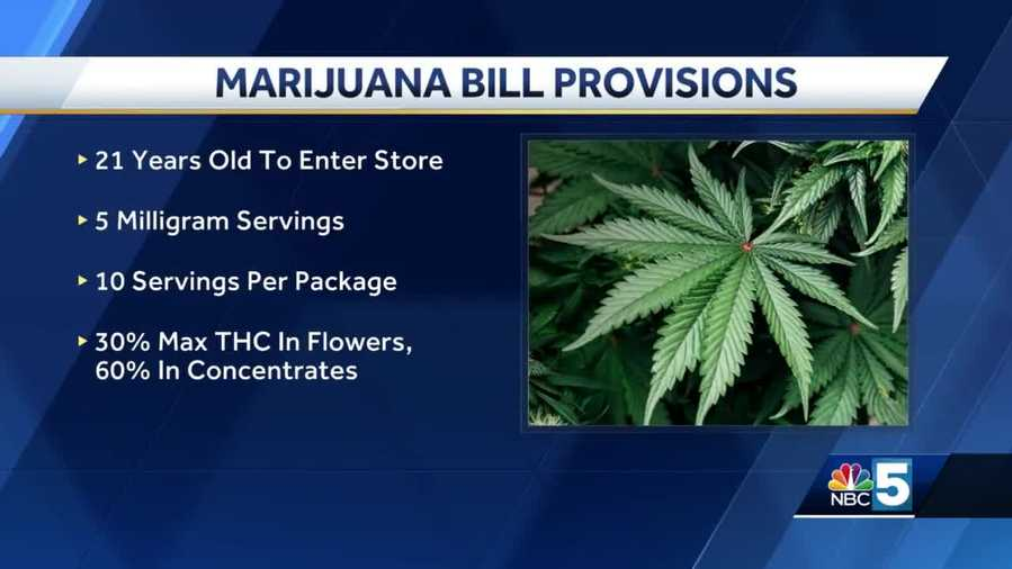Tim Briglin and Jim Masland represent Norwich, as well as Sharon, Strafford, and Thetford, in the Vermont House. Both voted against the legislation to allow retail marijuana sales. I wondered why and both men were kind enough to respond to my emails.
By way of background, Senate Bill 54 legalizes the retail sale of marijuana to folks 21 years of age and older. See inset below. However, S.54 is not yet law. Governor Phil Scott has not said whether he will sign it, according to a September 24 story by NBC5 News.

The final vote in the House passing the Bill was 92 to 56. I don’t know the breakdown by political party. However, in a March 5 story, VTDigger reported the House passed similar legislation 90-54. “The vote on the legislation fell largely along party lines, although a sizable number of Democrats joined Republicans in voting against the bill” wrote reporter Xander Landen.
Note also that two years earlier, Vermont legalized the recreational use of marijuana by passing Act 86. Representative Masland voted in favor of Act 86. Representative Briglin voted against. Act 86 did not address the issue of marijuana sales.
Nay on retail sales
Masland
In a June 2017 post on the Jim and Tim Report, Mr. Masland said he was in favor of allowing recreational use of pot. He nevertheless expressed concern about substance abuse by users of drugs, and in particular marijuana use by teens. “Hence on balance, we are better off facing marijuana head on than continuing ineffective prohibition. Better to direct resources towards substance abuse prevention than pretending we don’t have a problem.”
That lack of money available to combat substance abuse seemed to tip the scales for him against a retail market for marijuana.
In an email to me on Friday, he stated his two reasons for voting no.
1. While I appreciate the work of the committees to resolve the concerns of many, the bill had one fatal flaw. That is the bill creates a Substance Abuse Fund, but the considerable resources in the fund won’t become available until one full year after commercial sales become legal. That’s completely bass-ackwards. Even though proponents say youth will be prohibited from purchasing marijuana, in every state that has legalized sales, youth use of marijuana has increased. Without substantial funding to reduce substance abuse, the bill should not become law.
2. Those in the legislature have been inundated with information from all sides of the battle. I have read most of it and also reviewed information from other well researched work from a variety of sources. So what did I do? I contacted a variety of college classmates from each of the western states where commercial sales of marijuana have been legalized – California, Oregon, Washington, Colorado and Alaska. We studied together in the Bay Area in the late 60’s and early ’70’s when there plenty of drugs available. Among them are lawyers, child psychologists, community service organizers, a former health care commissioner, an architect and a judge. The clear response was, “Just say No.” One couple in particular made it clear that we won’t be raising nearly enough revenue (whether now or later) to overcome the substance abuse epidemic that we are creating. I acknowledge that substance abuse in Vermont involves much more that just marijuana, but let’s not make the problem worse.
Briglin
Mr. Briglin is also concerned about substance abuse but takes a slightly different approach. He believes the State’s 20% sales tax may help the black market in marijuana, leading to more teen use. Plus, he indicated that the need for more law enforcement and substance abuse counter-measures will eat up the added tax revenue.
His email said in part:
We’re down to a commercial question now and what will happen to the Vermont marijuana market when state government becomes an active participant. I believe that when VT puts a 20% tax on marijuana, institutes a variety of regulatory measures on retail establishments, agricultural setups, and processing facilities, the inflated cost of commercial marijuana will allow the black market to survive and possibly flourish. Opportunities to purchase marijuana will double and access for young people will grow, not shrink. Folks who think this is going to be windfall for the state budget will, I believe, be sadly disappointed. The tax revenue raised is going to be soaked up by law enforcement trying to stamp out the black market, regulatory oversight, public safety, consumer warning/education programs, and increased health care costs.
Never miss a new post on the Norwich Observer. Subscribe to my blog by submitting your email address in the subscribe box in the right column above. Thanks!



UPDATE “Gov. Phil Scott has decided to allow legislation creating a legal market for marijuana to go into law without his signature, clearing the way for recreational cannabis dispensaries to open up in Vermont as soon as October of 2022,” says VTDigger. https://vtdigger.org/2020/10/07/scott-lets-bill-establishing-marijuana-marketplace-become-law/